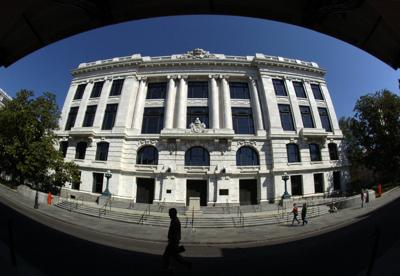The Louisiana Supreme Court on Friday recalled execution warrants that a judge had signed for two death row inmates who were each convicted of murder in Caddo Parish.
The court ruled in favor of condemned inmates Marcus Reed and Darrell Draughn, ordering the district judge in their cases to first consider their state claims for post-conviction relief before ordering new execution dates.
At the request of Caddo Parish District Attorney James Stewart, District Judge Donald Hathaway had set a May 28 execution date for Draughn, and a June 4 date for Reed. Their attorneys had argued that Reed and Draughn are a long way from being eligible to be killed.
Stewart argued that Draughn effectively abandoned his post-conviction claim years ago, and that Reed waited too long for a lawyer to file on his behalf for relief, following a legal process in which Reed’s lawyers were jettisoned from the case over an alleged conflict.
Hathaway’s signature on the two warrants placed Draughn and Reed at the center of a legal battle over just who among the state’s remaining 55 death row inmates might now be eligible to be executed, following the March 18 execution of Jessie Hoffman Jr. His killing by nitrogen gas ended a 15-year hiatus for executions in the state.
But a Louisiana Supreme Court majority found that Stewart acted out of turn in seeking both warrants. In a concurrence, Chief Justice John Weimer lamented the duration of the cases but urged “prudence,” saying an attempt to proceed with the two execution dates could only add to delays.
“It is incumbent on our system of justice to ensure the imposition of the sentence is properly applied, not in haste, but without delay for the sake of delay,” he wrote.
Justices Will Crain, Jay McCallum and Cade Cole offered dissents that argued the court should have waited for Hathaway to act on pending challenges to the execution warrants.
Stewart did not immediately respond to a message seeking comment.
Just how the court’s ruling affects the rest of death row is uncertain. Attorney General Liz Murrill, who supported the warrants, said each case is different while she argued that the cost to the state warrants new legislation she supports to speed up the process.
“This is the reason we need comprehensive reform of post-conviction relief. Lawyers for these individuals obtained delay after delay then did nothing. District Attorneys and judges let these cases falter as well,” Murrill said. “Now the victims’ families are suffering the consequences of their actions.”
Capital defense pointed to precedent, noting that courts in Louisiana and nationally have repeatedly turned back death warrants where the prisoners hadn’t exhausted their state post-conviction or federal habeas corpus appeal rights.
“The Louisiana Supreme Court recognized the fundamental principle that the state cannot send a man to the death chamber without at least allowing him to exhaust his appeals,” said Draughn’s lawyer, Cecelia Kappel of the Center for Social Justice at Loyola University, in a statement.
“If prisoners can be executed before they have completed all of their appeals, by warrants signed under cover of darkness, then all of our rights are seriously in jeopardy.”
Hoffman’s execution was Louisiana’s first since 2010, and the first that took place over a legal challenge for more than two decades. It followed a new law that Gov. Jeff Landry signed last year that added nitrogen gas to a new menu of options.
Unike Reed and Draughn, Hoffman’s attorneys acknowledged that he had exhausted his appeals.
Draughn was convicted and sentenced to death in 2003 for the murder of 64-year-old Lauretta White of Shreveport, who was found on April 6, 2000 in a pool of blood in her kitchen in what appeared to be a robbery gone awry. She’d been stabbed numerous times, including two fatal slashes in her jugular vein. The Louisiana Supreme Court denied Draughn’s appeal in 2007.
His attorneys argued that the district attorney’s office had no issues with an extension requested in 2011 for filing his post-conviction plea. A judge never ruled on it, and the last activity in the case came in 2011, before Stewart’s office sought an execution warrant.
Reed was convicted of murdering three brothers — Jeremiah, 20; Jarquis, 18; and Gene Adams, 13 — in August 2010 after a burglary at his home. The bodies were found in Jeremiah Adams’ silver Chevrolet Malibu, parked in the front yard of Reed’s home. At trial, Reed claimed it was a justifiable homicide, but the Louisiana Supreme court upheld his conviction and death sentence as well.
Stewart argued that Reed lost his chance to supplement his shell petition. In seeking the execution warrant, prosecutors pointed to a legal fight in 2019, when the district attorney challenged Reed’s representation by a team led by attorney Blythe Taplin, who also represented Reed on appeal.
The judge at the time set a Dec. 30, 2019 deadline for Reed’s attorneys to supplement his state petition. Reed recently filed a lengthy post-conviction application. The court’s ruling Friday demands that the judge first rule on it before he can be killed.



